ECO driving is moving to the top of the agenda at Hyundai with the launch of the new Ioniq - a car designed specifically to exploit electric power.
The Ioniq is a family-sized hatchback which will be available either as a petrol/electric hybrid, a pure electric vehicle or a plug-in hybrid, each offering the potential of huge tax savings.
Priced from £19,995 for the hybrid and £24,495 for the EV - after the £4,500 Government grant for low emission vehicles - the Ioniq is more than a match for the likes of the Toyota Prius and the Nissan Leaf.
All Ioniqs come with automatic emergency braking, adaptive cruise control and lane keeping systems and higher grade models, costing £1,800 more, feature a TomTom Live sat nav, wireless phone charging and full connectivity for Apple and Android devices.
It may be Hyundai's first take on hybrid and electric cars but it is a premium package that continues the Korean brand's upmarket shift.
Not only is the Ioniq high on value it is also exceptionally economical and comes with Hyundai's five year, unlimited mileage warranty which for the EV has been extended to eight years and 125,000 miles for the high capacity lithium-ion battery pack.
The electrical systems on both the hybrid and the pure electric car are effective and efficient giving the hybrid a theoretical fuel return of 83 to the gallon with emissions as low as 79g/km and the EV a range of almost 175 miles with zero emissions.
Real world figures are impressive and we averaged 63mpg on an open road run in the Ioniq hybrid and completed a similar 50 mile route in the Ioniq EV with almost 60 miles worth of battery power still available - and that included high speed motorway work.
The plug-in hybrid, which won't be available until next year, is expected to have emissions as low as 30g/km which equates to an incredible 215-plus miles per gallon - although that is purely on paper.
Both the hybrid and the EV - which will be available in October - are roomy, comfortable and nicely appointed with boot space ranging from 443 to 1,505 litres in the hybrid to 350 and 1,410 in the EV - the reduction to accommodate the batteries slung under the rear of the car.
Realistically it has little impact on the Ioniq's practical side and a bonus is a lower centre of gravity than a Golf GTI - all of which helps on the handling front.
The hybrid uses a six-speed dual clutch transmission rather than the CVT set up favoured by other hybrid car makers and it gives the Hyundai quite a sporty feel.
Not only does it start up in electric mode but it can also run at motorway speeds with the petrol engine disengaged and there are no gripes about its composure.
Drive modes on both versions of the Ioniq can be varied and on all but the basic models the digital instrument panel changes colour and layout accordingly. Move into sport mode and there's a red hue to the dials and the rev counter become predominant.
As with all electric cars there are plenty of displays about battery state and power flow and the Ioniq also has a digital read out for driving style measuring everything including ‘aggressive' throttle use - intriguing stuff.
The pure electric car comes with additional software to enable features such as pre-heating the cabin while still hooked up to the mains while the sat nav is configured to show EV relevant information such as the nearest available charging points.
The Ioniq hybrid is fitted with Hyundai's 1.6-litre Kappa petrol engine which is tried and tested but tuned for economy on this model. It develops 141ps and is hooked up to an electric motor delivering a further 43ps.
The result is a 0 to 60 acceleration time of 10.8 seconds and a maximum of 115mph. The power delivery is prompt and progressive - no lag as you can experience on other hybrids.
The electric version is even more rapid with the motor on the Ioniq EV pushing out the equivalent of 120ps. It can handle motorway speed with ease, accelerate rapidly if required and stop almost on a sixpence as soon as the accelerator is released.
That's down to its regenerative braking function which uses deceleration to help recharge the batteries and there are four degrees of regeneration which can be selected using paddle shifters mounted on the steering wheel.
The effect is as marked as on BMW's i3 electric car and means that with a bit of practice the Ioniq can be driven in traffic almost without having to use the brakes.
There is no gear lever to operate - just three buttons to press on the centre console for forward, neutral and reverse.
The Ioniq EV is also fitted with an electronic parking brake with an auto function for use in traffic. The hybrid has a foot operated parking brake mounted to the left of the pedals.
Inside, the Ioniq's cabin is nicely finished with trim highlights in blue on the hybrid and copper on the EV - touches which are repeated on the exterior, particularly across the rear diffuser.
The grille is blanked off on the EV to assist aerodynamics - the hybrid has an active shutter system for the same purpose - and the electric-only version comes with LED headlamps, another energy saving feature.
That apart the two cars are largely the same and look sleek and purposeful. Like Toyota with the Prius, Hyundai has opted for a split rear window to incorporate a spoiler which does impact on rearward vision although there is a camera system for manoeuvring.
As is the vogue with eco cars the Ioniq is ‘green' not just on performance but also in construction with environmentally-friendly materials used in the fabrics, plastics and the body finished with bio-paint.
On the EV version charging to 80 per cent capacity can be done in less than 35 minutes from a rapid charger. From a home charging point a full recharge will take around four-and-a-half hours.
Hyundai's mission statement with the Ioniq is to make eco driving affordable to everyone - and with the car priced so competitively against both the Prius and the Leaf it has considerable potential.
As a brand it has already set out its stall as an eco-champion by being the first to put a hydrogen-powered fuel cell car into mass production and that's on sale now as a £53,000 derivative of the ix35 SUV.
The Ioniq chops some £30,000 off that while still being minimal on emissions - just the ticket for the modern motorist.

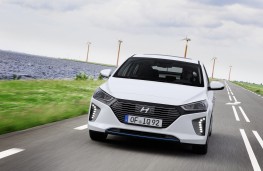
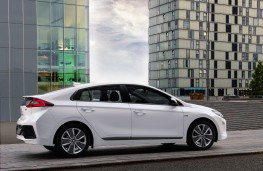
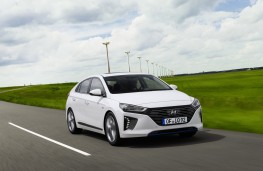
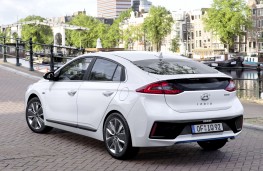
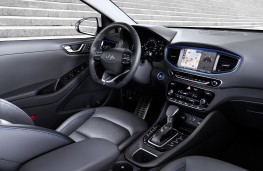
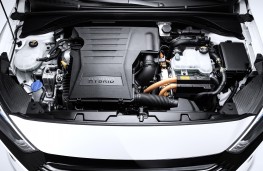
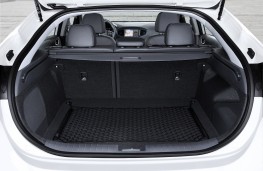

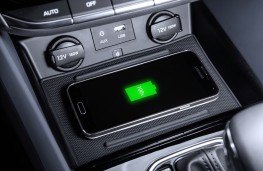
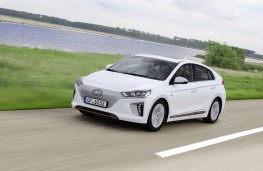
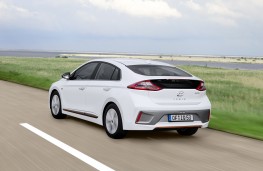
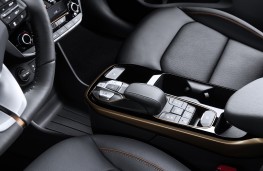
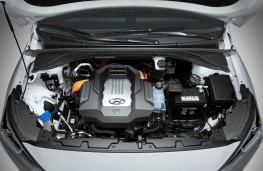
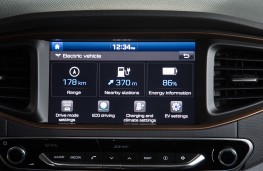
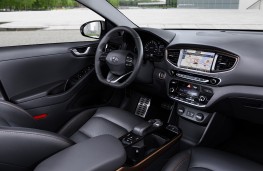
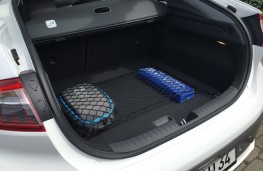


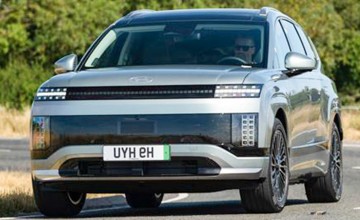
hyundaimotorunveilsnpx1conceptmodelattokyoautosalon.jpg)

